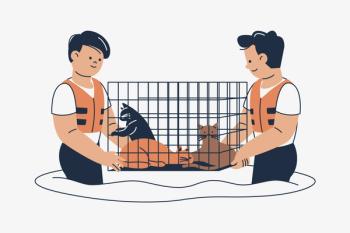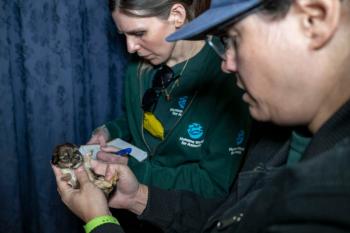
Wisconsin puppy-mills laws spur unintended consequences
Madison, Wis. - In rural Wisconsin, purebred dogs have been showing up in people's driveways, and some fear irresponsible breeders are dumping their "stock" ahead of new, stricter laws aimed at puppy mills.
MADISON, WIS. — In rural Wisconsin, purebred dogs have been showing up in people's driveways, and some fear irresponsible breeders are dumping their "stock" ahead of new, stricter laws aimed at puppy mills.
One of these dogs, 30-pound "Scrappy," resembled a Sheepdog until rescuers removed 40 pounds of matted fur to reveal a Fox Terrier, says Dianne Horlamus, executive director of the Sauk County Humane Society in southern Wisconsin. Another dog, a Miniature Pinscher, named "Peanut," stayed at the end of someone's driveway for days after being dumped, she recalls, sitting by the mailbox as if waiting for someone to come pick it up.
"We see a lot of lab, shepherd mixes; that's our standard. We're a very rural shelter and see more hunting breeds," Horlamus says. "We don't see purebreds, and we don't get the more desirable breeds."
But all that has changed in the last few months, ahead of a new law that took effect June 1 to regulate dog breeders and sellers. The law, approved back in December 2009 after a 12-year battle to its passage, will require anyone who shelters, breeds, raises or sells 25 or more dogs per year to be licensed and inspected, provide a certain level of veterinary care and follow other standards of care.
Over the last few weeks, Horlamus says her shelter has seen an influx of purebreds being dumped throughout the county, with the shelter's intake of purebreds increasing from its typical 1 percent to 75 percent in the month before the law took effect.
The dogs relinquished by their owners to the Sauk County shelter are still the typical mix of mutts and hunting breeds, but Horlamus says the strays picked up and brought to the shelter have certainly been increasing in pedigree.
"They are definitely (purebred), but you can tell they're not the high quality," Horlamus says, adding that leads her to believe the less-reputable breeders with poor-quality "stock" may be the ones doing the dumping. "We were thinking it's maybe because of the law coming up. We do live in an area with a lot of puppy mills."
In Scrappy's case, it's clear regular veterinary care was not provided, she says. His teeth were going bad and it looks as though he was used for seven or eight years and "probably outlived his usefulness."
"I think when it comes down to the inspections at some of these puppy millers, there are going to be a lot fewer dogs in their places."
Scanning through the pet ads in local papers, Holamus says she knows about 75 percent of the dogs are coming from puppy mills. She estimates that those who don't want to conform to the new laws, or have tried to reduce stock before the law took effect, put a lot of dogs down and dumped those that they may have had more of an attachment to. As inspections start to take place under the new law, Horlamus anticipates more drop-offs.
"I think all of our summer months are going to be pretty busy," she says. "The good thing for us, if there is a good thing, is they're usually adoptable breeds."
All the purebreds taken in to the shelter have been adopted, except one, Horlamus says.
Scrappy will go to a rescue group that she hopes will have better luck in placing him.
"He's really a cool little dog, but we haven't had the interest in him," she says. "But Scrappy's a really good, friendly, happy dog."
But not all shelters are experiencing an influx of purebreds, even though they are preparing for it, and Dr. Frederick Lord says he thinks the benefits of the new law, like others being enacted across the country, will outweigh any negatives.
"I think this is probably the best piece of legislation that is out there, I know other states are inquiring to Wisconsin about what they have," says Lord, a shelter veterinarian and hobby breeder in eastern Wisconsin who has supported the law for many years. "I know a lot of the people from all areas who are going to be touched by this who are less than supportive in many cases, but I've seen the negatives in all of those areas, as well."
His shelter has not seen an increase in purebred intakes, but the law won't affect everyone right away, he says. It will take time to get all the new licensees inspected, and there will be a time of adaptation and transition to deal with, he says.
"I'm sure there will be some difficult issues developing as far as dealing with number of animals that may be necessary to handle because of a commercial breeder going out of business, and that may take a couple years to struggle through that. When we get to that point, it should be better for everybody," Lord says. "I suspect it will eliminate the worst of the worst, but those who are left will be better prepared to provide a better product for the consumer. It's going to affect shelters, rescue groups, it will affect some purebred breeders. It will certainly affect the commercial dog breeders. I don't know that they know who all those people are at this point, but they are certainly listed in the thousands."
As states around Wisconsin cracked down on puppy mills, he began to see more mass-produced "designer dogs," Lord says. That trend was the impetus behind this bill, which focuses on providing a certain level of care for all dogs.
"The law is pointed toward the consumer in many respects, so they receive what they think they are getting. It will require all to have some kind of veterinarian relationship, which can only help the animals they are offering for sale. I also don't think anyone pro or con is totally happy with the bill, which might make it a good bill," he added with a laugh. "We needed something like this for a long time."
Newsletter
From exam room tips to practice management insights, get trusted veterinary news delivered straight to your inbox—subscribe to dvm360.






